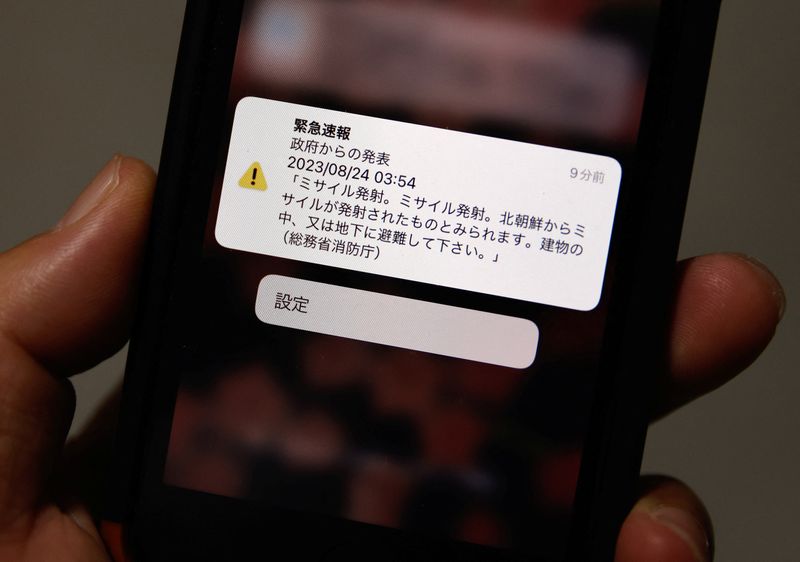North Korea says latest spy satellite launch failed, but will try again
2023.08.23 19:45
2/2

© Reuters. A smartphone screen shows J-Alert warning messages regarding North Korea appearing to have fired a missile and that residents of Okinawa prefecture should take cover indoors, in Chatan, Okinawa prefecture, Japan August 24, 2023. REUTERS/Issei Kato
2/2
By Josh Smith, Hyunsu Yim and Elaine Lies
SEOUL/TOKYO (Reuters) -North Korea’s second attempt to place a spy satellite in orbit failed on Thursday after the rocket booster experienced a problem during its third stage, state media reported, as space authorities vowed to try again in October.
Its first try in May also ended in failure when the new Chollima-1 rocket crashed into the sea.
The pre-dawn launch came in the first hours of an eight-day window that North Korea had given for the attempt.
The nuclear-armed country has been seeking to place what would be its first military spy satellite into orbit, saying it eventually plans a fleet of satellites to monitor moves by U.S. and South Korean troops.
“The flights of the first and second stages of the rocket were normal, but the launch failed due to an error in the emergency blasting system during the third-stage flight,” state news agency KCNA said of Thursday’s launch.
South Korea’s military said it tracked the flight from its launch at the North’s Sohae Satellite Launching Ground and also concluded that it was a failure.
The launch prompted an emergency warning in Japan just before 4 a.m. local time (1900 GMT) over the J-alert broadcasting system, telling residents of the southernmost prefecture of Okinawa to take cover indoors.
About 20 minutes following the alert, the Japanese government followed up with a notice that the missile had passed through towards the Pacific Ocean and lifted the emergency warning.
In a televised press conference, Japanese Chief Cabinet Secretary Hirokazu Matsuno said the repeated missile launches were a threat to regional security.
“We will strongly protest against North Korea and condemn it in the strongest possible terms,” he said.
Matsuno said parts of the rocket fell into the Yellow (OTC:) Sea, the East China Sea, and the Pacific Ocean.
South Korea’s National Security Council condemned the launch as a provocation and violation of U.N. Security Council resolutions banning the North’s use of ballistic missile technology.
North Korea’s attempted satellite launch violates multiple U.N. Security Council resolutions, the U.S. State Department said late on Wednesday, urging North Korea to refrain from “further threatening activity” and calling on Pyongyang to engage in serious diplomacy.
“Space launch vehicles (SLVs) incorporate technologies that are identical to, and interchangeable with, those used in ballistic missiles, including intercontinental ballistic missiles (ICBMs),” a State Department spokesperson said in a statement.
MORE LAUNCHES TO COME
North Korea’s National Aerospace Development Administration (NADA) said it would investigate and take steps to fix the cause of Thursday’s failure but that it “is not a big issue” in terms of the rocket system’s overall reliability.
“NADA expressed the stand that it would conduct the third reconnaissance satellite launch in October after thoroughly probing the reason and taking measures,” KCNA reported.
The North’s May 31 bid to launch the Chollima-1 satellite rocket also went wrong, with the booster and payload plunging into the sea after a failure in the second stage. State media blamed the setback on an unstable and unreliable new engine system and fuel.
South Korea recovered parts of that failed rocket, including the satellite payload, which it said did not appear to have military capability.
It was not a major surprise that Thursday’s launch appeared to have failed as well, but the state media report suggests that North Korea has made some progress since May’s crash, said Ankit Panda of the U.S.-based Carnegie Endowment for International Peace.
“There appear to still be time pressures for NADA to succeed given the commitment to an October follow-up launch,” he added. “That may or may not provide enough time for North Korea’s scientists to go back to the drawing board and iterate once again.”
The secretive North considers its space and military rocket programmes a sovereign right, and analysts say spy satellites are crucial to improving the effectiveness of its weapons.
North Korea has made multiple attempts to launch “earth observation” satellites, of which two appeared to have been successfully placed in orbit, including in 2016.
International observers have said the 2016 satellite seemed to be under control, but there was lingering debate over whether it had sent any transmissions.








